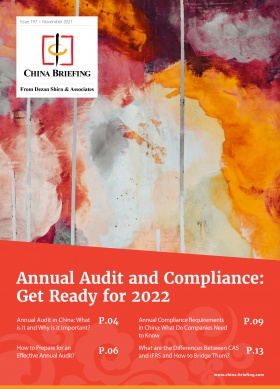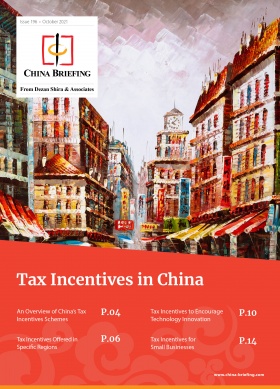China’s 2021 Negative Lists Widen Market Access for Foreign Investment
Two China negative lists of fields restricted to foreign investment have been further shortened in a new update. The 2021 versions reduce the number of sectors in which foreign investors are restricted or prohibited from participation, further opening access to key areas of the economy.
On December 27, 2021, the National Development and Reform Commission (NDRC) and the Ministry of Commerce (MOFCOM) jointly issued the updated versions of two “negative lists”, both of which will take effect on January 1, 2022. This is a move to further open China’s markets to foreign investors and promote high-quality development.
The two negative lists refer to the Special Administrative Measures (Negative List) for Foreign Investment Access (2021 Edition) (“2021 National Negative List”) (full list in Chinese available here and English translation available here) and the Special Administrative Measures (Negative List) for Foreign Investment Access in Pilot Free Trade Zones (2021 Edition) (“2021 FTZ Negative list”) (full list in Chinese available here English translation available here), which will replace their respective 2020 versions.
These two negative lists enumerate the industries where foreign investment will either be prohibited or restricted.
What is the latest reduction in restrictive/prohibitive measures affecting foreign investment?
For five years in a row, the two new negative lists have continued to reduce the number of measures limiting access to foreign investment.
The 2021 National Negative List has removed two restricted items from its 2020 counterpart, cutting it 33 to 31, while the new 2021 FTZ Negative List removed three items, cutting it down to 27 from 30.
Further opening of the manufacturing sector
The new negative lists further liberalize restrictions on foreign ownership in the field of automobile manufacturing. The restrictions that were loosened are the cap on the share ratio of foreign investment in passenger car manufacturing and the regulation dictating that one foreign investor cannot establish more than two joint ventures to manufacture the same types of vehicle in China.
The negative lists also level the playing field for foreign and domestic investors operating in the field of radio and television equipment manufacturing, lifting the restrictions on foreign investment in satellite television broadcasting ground receiving facilities and the production of key components.
In addition, there will be no restrictions on foreign investment in the manufacturing sectors in Pilot Free Trade Zones.
Further relaxing of service sectors in the FTZs
Restrictions on foreign investment in the field of market research have now been lifted. However, radio and television rating surveys must still be controlled by the Chinese party.
Foreign investors will now also be allowed to invest in the field of social surveys, but the Chinese shareholding ratio can be no less than 67%, and the legal representative must be a Chinese national.
More detailed explanatory notes
The negative lists were released alongside explanatory notes, which, among other things, clarify restrictions on Chinese companies that are operating in fields that are restricted from receiving foreign capital.
The notes explain that Chinese companies engaged in one of the fields prohibited from receiving foreign investment must undergo a review and approval process by the government before they can list on a stock market overseas. China’s securities regulators and relevant authorities will implement precise management of overseas listing and financing of these domestic enterprises.
The new provision means foreign investors that were previously shut out of certain sectors in China will be able to buy the shares of the overseas listed companies.
However, it should be noted that foreign investors are not permitted to participate in the operation and management of these enterprises, and their shareholding ratio must be governed in accordance with the relevant regulations on the management of foreign investment in domestic securities. This means that total foreign ownership in such a company be capped at 30 percent, with no single investor holding more than 10 percent of the company share.
Companies listed overseas that exceed the cap do not need to reduce the percentage of foreign ownership, said the NDRC spokesman said in a press conference this Monday. This is to make foreign investment management more “precise and inclusive”, the spokesman said.
The notes also add that foreign-invested enterprises must comply with the relevant provisions of the Negative Lists for investing in China, in accordance with the Regulations for the Implementation of the Foreign Investment Law.
In order to properly link the Negative Lists and the Negative List for Market Access, the explanatory notes added that “Foreign and domestic investors must uniformly apply the relevant provisions of the Negative List for Market Access”.
A thorough comparison of the 2020 National Negative List and the 2021 National Negative List can be found below.
| Changes to China’s 2021 National Negative List | ||
| 2020 National List | 2021 National Negative List | |
| Manufacturing | Except for special purpose vehicles, new energy vehicles, and commercial vehicles, the Chinese party in complete automobile manufacturing shall hold no less than 50% of the shares; a foreign investor may establish two or fewer equity joint ventures in China to manufacture the same type of complete automobile products. (The restriction on the shareholding percentage of foreign investors in the manufacturing of passenger cars and the restriction that one foreign investor may establish two or fewer joint ventures in China to manufacture the same type of vehicles will be removed in 2022). | Removed |
| Manufacturing of satellite television ground receiving facilities and key components. | Removed | |
A thorough comparison of the 2020 FTZ Negative List and the 2021 FTZ Negative List can be found below.
| Changes to China’s 2021 FTZ Negative List | ||
| 2020 FTZ Negative List | 2021 FTZ Negative List | |
| Manufacturing | Except for special purpose vehicles, new energy vehicles, and commercial vehicles, the Chinese party in complete automobile manufacturing shall hold not less than 50% of the shares; a foreign investor may establish two or fewer equity joint ventures in China to manufacture the same type of complete automobile products. (The restriction on the shareholding percentage of foreign investors in the manufacturing of passenger cars and the restriction that one foreign investor may establish two or fewer joint ventures in China to manufacture the same type of vehicles will be removed in 2022) | Removed |
| Manufacturing of satellite television ground receiving facilities and key components. | ||
| Leasing and business services | Market research projects shall be limited to the form of equity joint venture; therein, controlling stake in radio and television rating survey shall be held by the Chinese party. | Controlling stake in radio and television rating survey shall be held by the Chinese party. |
| Investment in social survey services shall be prohibited. | The Chinese party in social survey services shall hold no less than 67% of shares and the legal representative shall be a Chinese citizen. | |
Looking forward
China’s foreign investment landscape is changing. With rising labor wages and other manufacturing costs, more investors are starting to cast their eyes on China’s huge market base and high-end manufacturing capabilities. The liberalization facilitated by the 2021 new negative lists will accelerate this trend.
The new lists also signal a new level of market opening – they will boost foreign investor confidence in China and accelerate structural upgrades to the country’s existing supply chains.
As to the implementation of the two Negative Lists, the NDRC said if the current laws or regulations need to be adjusted, the relevant departments will do so within two years. That is to say, all the new opening measures are expected to be implemented by the end of 2024 at the latest.
Looking forward, the negative lists are expected to be shortened further. Investors planning to engage in relevant areas are advised to keep a close eye on future developments. For assistance in China, please contact us at china@dezshira.com.
About Us
China Briefing is written and produced by Dezan Shira & Associates. The practice assists foreign investors into China and has done so since 1992 through offices in Beijing, Tianjin, Dalian, Qingdao, Shanghai, Hangzhou, Ningbo, Suzhou, Guangzhou, Dongguan, Zhongshan, Shenzhen, and Hong Kong. Please contact the firm for assistance in China at china@dezshira.com.
Dezan Shira & Associates has offices in Vietnam, Indonesia, Singapore, United States, Germany, Italy, India, and Russia, in addition to our trade research facilities along the Belt & Road Initiative. We also have partner firms assisting foreign investors in The Philippines, Malaysia, Thailand, Bangladesh.
- Previous Article China, Cyprus Builds Strategic Partnership, Promote China-EU Cooperation and BRI
- Next Article China’s Negative List for Foreign Investment Access (New Edition): English Version Available







